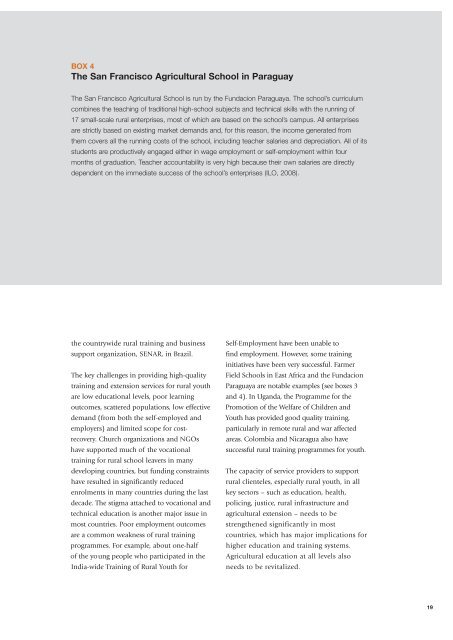Promoting livelihood opportunities for rural youth - IFAD
Promoting livelihood opportunities for rural youth - IFAD
Promoting livelihood opportunities for rural youth - IFAD
Create successful ePaper yourself
Turn your PDF publications into a flip-book with our unique Google optimized e-Paper software.
BOX 4<br />
The San Francisco Agricultural School in Paraguay<br />
The San Francisco Agricultural School is run by the Fundacion Paraguaya. The school’s curriculum<br />
combines the teaching of traditional high-school subjects and technical skills with the running of<br />
17 small-scale <strong>rural</strong> enterprises, most of which are based on the school’s campus. All enterprises<br />
are strictly based on existing market demands and, <strong>for</strong> this reason, the income generated from<br />
them covers all the running costs of the school, including teacher salaries and depreciation. All of its<br />
students are productively engaged either in wage employment or self-employment within four<br />
months of graduation. Teacher accountability is very high because their own salaries are directly<br />
dependent on the immediate success of the school’s enterprises (ILO, 2008).<br />
the countrywide <strong>rural</strong> training and business<br />
support organization, SENAR, in Brazil.<br />
The key challenges in providing high-quality<br />
training and extension services <strong>for</strong> <strong>rural</strong> <strong>youth</strong><br />
are low educational levels, poor learning<br />
outcomes, scattered populations, low effective<br />
demand (from both the self-employed and<br />
employers) and limited scope <strong>for</strong> costrecovery.<br />
Church organizations and NGOs<br />
have supported much of the vocational<br />
training <strong>for</strong> <strong>rural</strong> school leavers in many<br />
developing countries, but funding constraints<br />
have resulted in significantly reduced<br />
enrolments in many countries during the last<br />
decade. The stigma attached to vocational and<br />
technical education is another major issue in<br />
most countries. Poor employment outcomes<br />
are a common weakness of <strong>rural</strong> training<br />
programmes. For example, about one-half<br />
of the young people who participated in the<br />
India-wide Training of Rural Youth <strong>for</strong><br />
Self-Employment have been unable to<br />
find employment. However, some training<br />
initiatives have been very successful. Farmer<br />
Field Schools in East Africa and the Fundacion<br />
Paraguaya are notable examples (see boxes 3<br />
and 4). In Uganda, the Programme <strong>for</strong> the<br />
Promotion of the Welfare of Children and<br />
Youth has provided good quality training,<br />
particularly in remote <strong>rural</strong> and war affected<br />
areas. Colombia and Nicaragua also have<br />
successful <strong>rural</strong> training programmes <strong>for</strong> <strong>youth</strong>.<br />
The capacity of service providers to support<br />
<strong>rural</strong> clienteles, especially <strong>rural</strong> <strong>youth</strong>, in all<br />
key sectors – such as education, health,<br />
policing, justice, <strong>rural</strong> infrastructure and<br />
agricultural extension – needs to be<br />
strengthened significantly in most<br />
countries, which has major implications <strong>for</strong><br />
higher education and training systems.<br />
Agricultural education at all levels also<br />
needs to be revitalized.<br />
19

















